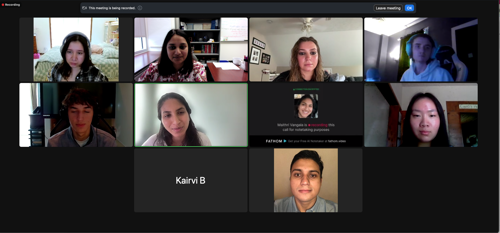 This Spring, the University of Southern Indiana Romain College of Business partnered with behavioral health data analytics company Holmusk to work with their unique data analytics platform NeuroBlu, an education and research tool. USI’s Computer Science (CS) Program is utilizing the platform to analyze the data behind behavioral health records. NeuroBlu is a comprehensive source of real-world data on behavioral health conditions, treatments and symptoms.
This Spring, the University of Southern Indiana Romain College of Business partnered with behavioral health data analytics company Holmusk to work with their unique data analytics platform NeuroBlu, an education and research tool. USI’s Computer Science (CS) Program is utilizing the platform to analyze the data behind behavioral health records. NeuroBlu is a comprehensive source of real-world data on behavioral health conditions, treatments and symptoms.
CS students in the Romain College of Business have become some of the first undergraduate students in the country to have access to a database that includes over 30 million anonymized patient records and 20+ years of data. This gives students the opportunity to work with real-world data, in a mental health context, at a large scale before they enter the job field.
“Access to such a huge amount of clean and structured data ready to be used for analysis is very difficult to come by for researchers in computer science,” said Dr. Srishti Srivastava, USI Associate Professor of Computer Science. “Our CS students having access to this platform’s data along with an already identified large library of selected and validated machine learning algorithms that will greatly help them graduate as computer scientists with significantly unique skill sets.”
Talks of the partnership with Holmusk first began in late 2022 when Dr. Sudesh Mujumdar, Dean of the Romain College of Business, connected Nawal Roy, CEO of Holmusk, with USI faculty and leadership and identified the impact the company’s platform could have for students.
“Mental health is a defining problem of our current generation, and better evidence is needed to drive transformation in the field,” said Roy. “Different communities and stakeholders are tackling this issue in a variety of unique ways, and we’re thrilled to welcome the University of Southern Indiana as a partner addressing these challenges.”
Srivastava put together a team of computer science majors, including Kairvi Bhatt, Joshua Dellamuth, Sydney Given, Addison Higgins, Peyton Hopkins, Tyler Lofthouse and Cathy Sandoval, to develop code to help go through the 30 million data points in the NeuroBlu database. The students trained with Srivastava to learn technologies like Python coding for machine learning and TensorFlow certification from Google.
The project started in Srivastava’s Artificial Intelligence course (CS 461) and continued outside of class. Students will work this summer and into the fall as part of a capstone project, continually digging into the data.
“This is a really good experience for us to see what real-world data looks like,” Bhatt said. “It’s a really good experience to work with a dataset that’s not available at any other university. We’re fortunate to experience this.”
 After research and coding, students now have the opportunity to analyze their findings about behavioral health conditions, symptoms and treatments. This project has been special to Given, as she comes from a healthcare background. Before her time at USI, she worked as an intern in a research clinic in one of the Eskenazi hospitals dealing with schizophrenia patients. While doing data entry, she noticed the kind of impact certain treatments had on the patients just within the first six months.
After research and coding, students now have the opportunity to analyze their findings about behavioral health conditions, symptoms and treatments. This project has been special to Given, as she comes from a healthcare background. Before her time at USI, she worked as an intern in a research clinic in one of the Eskenazi hospitals dealing with schizophrenia patients. While doing data entry, she noticed the kind of impact certain treatments had on the patients just within the first six months.
“Our main goal is to take our broader understanding of what we’ve learned and to be able to take a singular template and break everything down and show how it interacts,” Given said. “This really hits the sweet spot between the background of what I do as a job and what I do for my degree.”
For Srivastava, it’s been a fruitful experience to see her students get to do something she never got to do until post-graduation. The partnership with Holmusk and utilization of the NeuroBlu platform will continue this summer and fall.
“Even as a PhD student, I didn't have access to such large-scale real-world data, especially anonymized data in health fields because it's difficult to get it. If you're able to get it for undergrad students, that's unique,” she said. “We’re in a world of data analytics and machine learning and generative AI, and for the students to have access to this kind of data is a very unique experience and a valuable technical skill to have when they walk out with that degree.”